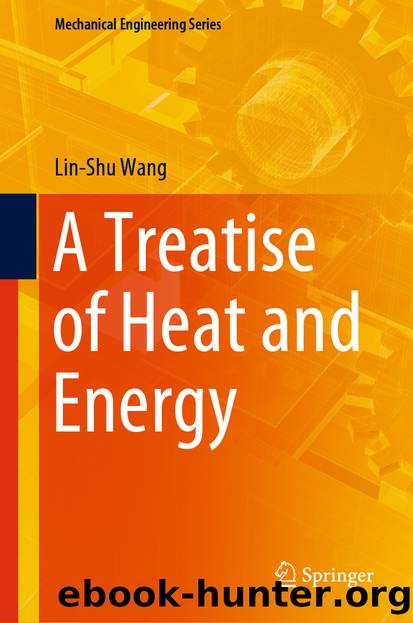A Treatise of Heat and Energy by Lin-Shu Wang

Author:Lin-Shu Wang
Language: eng
Format: epub
ISBN: 9783030057466
Publisher: Springer International Publishing
6.2 Quasi-static Processes and the Classical (Caratheodory) Formalism
Carathéodory [3] set out to develop an alternative formulation to the definition of entropy , (62A), in Chap. 5, without using the reversible thermal machines. He began by noting the application of the first law, , to an adiabatic composite system (which consists of subsystems, e.g., two subsystems â1â and â2â) separated diathermanously undergoing quasi-static adiabatic processes
Because of being diathermanously related, the two subsystems are at the same temperature.
By âquasi-staticâ he meant, âA process that occurs so slowly that the difference between the work performed externally and the preceding limit, pdV, is smaller than the uncertainty of our measurementsâ [3:238]. A quasi-static process is an infinitely slow process.
On the same page, however, he added, âa quasistatic adiabatic process can be regarded as a series of [infinitely dense succession of] equilibrium statesâ [3:238]. Callen [5:96] also defined quasi-static processes to be âin terms of a dense succession of equilibrium states.â I make the interpretation here that both Carathéodory and Callen equated infinitely dense processes with infinitely slow processes as synonymous terms. In the following, a restated version is used for discussion in this chapter as the definition of quasi-static process (quasi-equilibrium process) set:The set consists of a subset-series of infinitely dense succession of equilibrium states and the corresponding subsets of all spontaneous transient states between each pairs of equilibrium states in the series.
Download
This site does not store any files on its server. We only index and link to content provided by other sites. Please contact the content providers to delete copyright contents if any and email us, we'll remove relevant links or contents immediately.
| Automotive | Engineering |
| Transportation |
Whiskies Galore by Ian Buxton(41961)
Introduction to Aircraft Design (Cambridge Aerospace Series) by John P. Fielding(33102)
Small Unmanned Fixed-wing Aircraft Design by Andrew J. Keane Andras Sobester James P. Scanlan & András Sóbester & James P. Scanlan(32775)
Craft Beer for the Homebrewer by Michael Agnew(18218)
Turbulence by E. J. Noyes(8000)
The Complete Stick Figure Physics Tutorials by Allen Sarah(7349)
Kaplan MCAT General Chemistry Review by Kaplan(6913)
The Thirst by Nesbo Jo(6905)
Bad Blood by John Carreyrou(6597)
Modelling of Convective Heat and Mass Transfer in Rotating Flows by Igor V. Shevchuk(6419)
Learning SQL by Alan Beaulieu(6259)
Weapons of Math Destruction by Cathy O'Neil(6243)
Man-made Catastrophes and Risk Information Concealment by Dmitry Chernov & Didier Sornette(5977)
Digital Minimalism by Cal Newport;(5732)
Life 3.0: Being Human in the Age of Artificial Intelligence by Tegmark Max(5532)
iGen by Jean M. Twenge(5397)
Secrets of Antigravity Propulsion: Tesla, UFOs, and Classified Aerospace Technology by Ph.D. Paul A. Laviolette(5356)
Design of Trajectory Optimization Approach for Space Maneuver Vehicle Skip Entry Problems by Runqi Chai & Al Savvaris & Antonios Tsourdos & Senchun Chai(5051)
Pale Blue Dot by Carl Sagan(4978)
